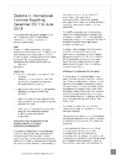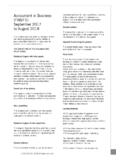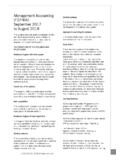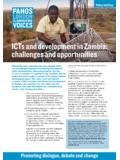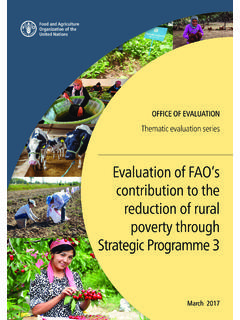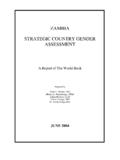Transcription of Key health challenges for Zambia - Home | ACCA Global
1 Key health challenges for Zambia2 This paper provides an oversight into some of the key issues facing the health sector in Zambia and describes the role professionally qualified accountants can play in delivering the country s health ACCAACCA (the Association of Chartered Certified Accountants) is the Global body for professional accountants. We aim to offer business-relevant, first-choice qualifications to people of application, ability and ambition around the world who seek a rewarding career in accountancy, finance and in 1904, ACCA has consistently held unique core values: opportunity, diversity, innovation, integrity and accountability. We believe that accountants bring value to economies in all stages of development.
2 We aim to develop capacity in the profession and encourage the adoption of consistent Global standards. Our values are aligned to the needs of employers in all sectors and we ensure that, through our qualifications, we prepare accountants for business. We work to open up the profession to people of all backgrounds and remove artificial barriers to entry, ensuring that our qualifications and their delivery meet the diverse needs of trainee professionals and their support our 154,000 members and 432,000 students in 170 countries, helping them to develop successful careers in accounting and business, with the skills needed by employers. We work through a network of over 80 offices and centres and more than 8,400 Approved Employers worldwide, who provide high standards of employee learning and development.
3 The Association of Chartered Certified Accountants, A pril 2013 ContentsForeword 31. Introduction 52. The health system in Zambia 63. Roundtable discussion 1: health sector reform and why this is necessary for national development 194. Roundtable discussion 2: Should investment focus on preventative or curative care? 225. Roundtable discussion 3: National health Insurance in Zambia 246. Roundtable discussion 4: How collaborative technology can be used to improve the provision of healthcare 257. Roundtable discussion 5: The role of the accountancy profession in healthcare delivery 268. Conclusion 28 References 29 KEY health challenges FOR ZAMBIA3I would like to thank the ACCA for organising the health forum to which my office was invited.
4 The participation of the Ministry of health during this meeting was key as it provided an opportunity for the health care providers to interact with the participants and give an insight into challenges faced by the health care sector in the resource mobilisation and how these challenges could be addressed through concentrated efforts by professional bodies such as a way of addressing these challenges , the Ministry proposes to introduce a Social health Insurance which will soon be implemented and with this, it is our hope that we will realise our mission of providing equitable access to cost effective, quality, health care services as close to the family as would like to appreciate the contribution made by the accountancy profession towards health service delivery in Zambia .
5 Professional accountants have played a critical role in helping build capacity in the health sector and in strengthening health systems in areas such as financial reporting and good governance. The accountancy profession is critical to the delivery of quality health care in that the prudent utilisation of financial resources translates into improved health service delivery. Lastly, I thank the ACCA for partnering with the Ministry of health in trying to address challenges faced in the provision of health care in Zambia . Hon. Minster of health , Dr Joseph Kasonde4 KEY health challenges FOR ZAMBIA5 The Zambian government has set itself the ambitious target To provide equitable access to cost effective, quality health services as close to the family as possible (MOH 2011: page x).
6 Achieving this objective will require significant health reform: limited resources, high levels of poverty, poor physical infrastructure, geography and sparse population in rural areas all hamper the delivery of health care services and create challenges for policymakers and planners. A greater insight into some of these issues was provided at a health conference organised recently by the Association of Chartered Certified Accountants (ACCA) in Lusaka. The event gave politicians, health policymakers and senior ACCA members employed in the field of health the opportunity to discuss some of the key health challenges facing Zambia , to debate potential solutions and then to consider the role that ACCA accountants can play in supporting the government to achieve its goal of improving the health of the population.
7 Speakers at the event included: Hon. Christopher Mulenga MP, deputy minister of health Dr Faston Goma, dean, School of Medicine, University of Zambia Dr Lackson Kasonka, managing director, University Teaching Hospital Dr Tim Meade MD, medical director, Corpmed Medical Centre Mr Patrick Phiri, technical expert manager, Deloitte & Touche Mr Mark Millar, interim chief executive Milton Keynes NHS Foundation Trust, England and ACCA council IntroductionThe wide-ranging discussions focused on five key themes: health sector reform and why this is necessary for national development whether investment should focus on preventative or curative care National health Insurance in Zambia how collaborative technology can be used to improve the provision of health care the role of the accounting profession in health care The health system in ZambiaLocated in sub-Saharan Africa, Zambia is a landlocked country covering an area of approximately 752,614 sq.
8 Km. Formerly a British colony, Zambia attained independence in 1964 and since that time has been politically stable. For administrative purposes Zambia is divided into 10 provinces, of which two (Lusaka and Copperbelt) are classed as urban and eight as rural; the provinces are subdivided into 72 districts. Over the last 10 years the population of Zambia has increased at an average rate of a year, reaching in 2011. The most heavily populated provinces are Lusaka ( ) and Copperbelt (2m). The country has a very young population with below the age of 15 and in the age range 15 24. The vast majority of the population work in the informal sector (Table ).districts and through encouraging local representation on health management boards.
9 The Ministry of health (MOH) was given responsibility for policy, financing and regulation, and a new organisation, the Central Board of health (CBOH), was tasked with service 2005, the health policy had become outdated and the health Services Act 1995 was repealed. A year later, in 2006, the CBOH was dissolved, being replaced with the current four-tier structure: MOH, with responsibility for policy, regulation and standard setting Provincial health Offices, with responsibility for performance management at the provincial level District health Offices, with responsibility for coordination, planning and support at district level Neighbourhood health Committees, with responsibility for overseeing services at the community addition, national units were established to oversee specific health programmes, including the National Malaria Control Center, Reproductive health Unit, Tuberculosis and Leprosy Control Unit, and National Aids care is provided by a multitude of providers, including the MOH, church organisations.
10 The private sector (both not for profit and for profit) and alternative providers. The vast majority Table : Distribution of currently employed persons aged 15 years and above by (institutional) sector and sector of employment, 2008 SectorFormalInformalTotalCentral government2 0 9, 5 4 602 0 9, 5 4 6 Local government26,891026,891 Parastatal40,000040,000 Private225,012659,213884,226 NGO/church13,4 8517, 4 7 930,964 International organisations4,6752,0596,734 Households03,969,9913,969,991 Others2,56650,84253,408 Tot al52 2,1764, 69 9, 5 8 55, 2 21,761 Source: Labour Statistics Branch, (2010): 58 Zambia is classed as a lower-middle-income country but, through successive five-year development plans (Vision 2030), the government aims to transform Zambia into a prosperous middle-income nation by 2030 (Government of Republic of Zambia 2011: xii).





